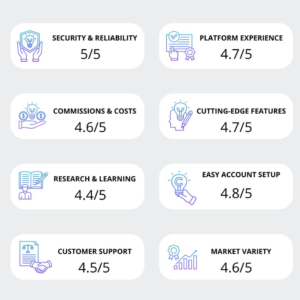This article may contain references to products or services from one or more of our advertisers or partners. We may receive compensation when you click on links to those products or services. Nonetheless, our opinions are our own.
The information presented in this article is accurate to the best of our knowledge at the time of publication. However, information is subject to change, and no guarantees are made about the continued accuracy or completeness of this content after its publication date.
The crypto boom has got countries everywhere scrambling to set up rules to keep an eye on digital asset action. With digital currencies popping up in everyday use, governments and banks are hustling to juggle fresh ideas with the need to follow the law. For businesses wanting to play it straight, build trust with the big players, and stick around in this ever-shifting money game, nabbing a crypto license is a game-changer.
Understanding the Importance of a Crypto License
The cryptocurrency license is the official authority given to companies for performing activities concerning digital assets. It indicates the fulfillment of a country-specific legal framework, ensuring that the operations conducted are transparent and trustworthy. This license only adds to the trustworthiness of a venture while also facilitating partnerships and customer acquisition because it proves their willingness to follow the rules.
Furthermore, regulatory approval secures easy access to financial services by businesses. Essentially, it becomes rather difficult for banks and payment providers to provide services to unlicensed crypto firms because of money laundering and fraud concerns. A crypto license serves to demonstrate to the banks and other financial institutions the firm intent of the business to pursue legal and financial integrity in all its dealings, thus fostering banking relationships and access to very vital financial services.
The Evolving Regulatory Landscape in Poland
Poland’s turning into a great spot for crypto companies because it’s cool with digital stuff. If you’re thinking about getting a crypto license in Poland, you’ll see the rules are changing to match up with the EU’s new crypto plan, called MiCA. They’re swapping out the old licenses for something called CASP licenses, showing Poland’s ready to roll with EU standards. It’s all about making sure crypto businesses can run smoothly, openly, and safely in the money world.
Steps to Obtain a Crypto License in Poland
- Establish a Legal Entity: Initiate the procedure of forming a limited liability company or another recognized legal structure within Poland. Having an entity properly registered ensures compliance with corporate laws and makes it easier to get approvals from regulation.
- Prepare Necessary Documentation: The company will have to pull together a bunch of paperwork, like a solid business plan, some risk assessment reports, proof they’ve got a real office somewhere, and details on the main people running the show. These files are what the regulators dig into to figure out if the business is legit and knows what it’s doing.
- Comply with Regulatory Requirements: Ensure compliance with the anti-money laundering (AML) and counter-terrorism financing (CTF) regulations of Poland. This is crucial because reaching with or renewing a crypto license entails compliance with such provisions.
- Submit Application: Send off the finished application along with all the extra paperwork to the right regulatory folks in Poland so they can take a good look at it. They might come back with a few more questions or dig a little deeper to make sure everything checks out compliance-wise.
Keeping up with legislative changes is crucial since Poland’s crypto rules are always shifting to align with global standards. Businesses should team up with legal pros to make sure they’re staying on the right side of the law.
Canada’s Approach to Cryptocurrency Regulation
Canada has a smart approach to regulating cryptocurrencies, ensuring everything runs smoothly. Both local and international platforms dealing with digital currencies are considered money services businesses (MSBs). So, if you want a crypto license in Canada, you must register with the Financial Transactions and Reports Analysis Centre of Canada (FINTRAC).
The country follows a risk-based approach, focusing on preventing money laundering and illegal activities while still allowing innovation to grow. This clear and balanced system has made Canada a popular choice for crypto businesses looking for a stable and well-regulated environment.
Process for Acquiring a Crypto License in Canada
- Register as an MSB: Begin by registering the business with FINTRAC, Canada’s financial intelligence unit. This step is crucial for legal operation within the country.
- Develop Compliance Programs: Establish robust AML and CTF policies tailored to the specific risks associated with cryptocurrency operations. Businesses must implement measures to detect and prevent illicit activities.
- Implement Reporting Mechanisms: Set up systems to detect and report suspicious transactions, ensuring transparency and regulatory compliance. Failure to comply with reporting obligations can result in severe penalties.
- Undergo Regular Audits: Be prepared for periodic reviews by regulatory bodies to assess adherence to established guidelines. Businesses must maintain records and demonstrate compliance with ongoing reporting requirements.
For companies itching to jump into the Canadian market fast, one solid option is snapping up a fast-track crypto license. Bringing in legal and regulatory pros can smooth out the application grind, speeding things up while making sure all the must-haves are ticked off and fully in line.
Voted "Best Overall Budgeting App" by Forbes and WSJ
Monarch Money helps you budget, track spending, set goals, and plan your financial future—all in one app.
Get 50% OFF your first year with code MONARCHVIP
Global Perspectives on Cryptocurrency Licensing
Outside of Poland and Canada, a bunch of other places have cooked up their own rulebooks to roll with the expanding crypto wave. Getting a grip on these regulations is a must for any business eyeing a bigger footprint across borders.
European Union and MiCA Regulations
The European Union’s working on rolling out the MiCA regulations, trying to pull together a single set of rules for crypto stuff across all its member countries. This move is all about beefing up protection for folks using it, stopping shady market tricks, and giving businesses in the EU some clear legal ground to stand on. MiCA’s likely to shake up the global crypto scene big time, setting an example that other parts of the world might follow.
Other Notable Jurisdictions
Places like Lithuania, Estonia, and Gibraltar have rolled out the welcome mat for crypto businesses, each with its own playbook of rules and perks. Take Lithuania, for example, grabbing a crypto license there lets companies run wild across the EU, thanks to its slick processes and a regulatory setup that’s got their back. These spots come with some sweet deals, like cheaper running costs and tax breaks that give them an edge.
Advantages of Holding a Crypto License
Landing a crypto license comes with a bunch of upsides. For starters, it keeps everything on the right side of the law, both local and global, cutting down the odds of getting tangled up in legal messes. Plus, it boosts your street cred. When a business has that license in hand, it shows they’re serious about playing fair and sticking to the rules, which goes a long way in winning over clients, investors, and partners.
Challenges in the Licensing Process
Getting a crypto license has its perks, no doubt, but the road to snagging one can be a real headache. The big challenge? Regulations are all over the place, different rules in every corner of the world, and they keep changing. Companies have to stay on top of what’s new and keep everything legit, often leaning on savvy legal experts to navigate the twists and turns.
Conclusion
The crypto world keeps changing, and snagging a license is getting more crucial for businesses wanting to run legit and hold their own. Whether you’re looking at a crypto license in Poland, digging into options in Canada, or sizing up other places, figuring out the local rules is a big deal. Hooking up with savvy legal advisors and staying on top of regulatory shifts will help companies handle the crypto industry’s ups and downs like champs.

Reviewed and edited by Albert Fang.
See a typo or want to suggest an edit/revision to the content? Use the contact us form to provide feedback.
At FangWallet, we value editorial integrity and open collaboration in curating quality content for readers to enjoy. Much appreciated for the assist.
Did you like our article and find it insightful? We encourage sharing the article link with family and friends to benefit as well - better yet, sharing on social media. Thank you for the support! 🍉
Article Title: Navigating Cryptocurrency Licensing in Poland, Canada, and Beyond
https://fangwallet.com/2025/04/05/navigating-cryptocurrency-licensing-in-poland-canada-and-beyond/The FangWallet Promise
FangWallet is an editorially independent resource - founded on breaking down challenging financial concepts for anyone to understand since 2014. While we adhere to editorial integrity, note that this post may contain references to products from our partners.
The FangWallet promise is always to have your best interest in mind and be transparent and honest about the financial picture.
Become an Insider

Subscribe to get a free daily budget planner printable to help get your money on track!
Make passive money the right way. No spam.
Editorial Disclaimer: The editorial content on this page is not provided by any of the companies mentioned. The opinions expressed here are the author's alone.
The content of this website is for informational purposes only and does not represent investment advice, or an offer or solicitation to buy or sell any security, investment, or product. Investors are encouraged to do their own due diligence, and, if necessary, consult professional advising before making any investment decisions. Investing involves a high degree of risk, and financial losses may occur including the potential loss of principal.
Source Citation References:
+ Inspo
There are no additional citations or references to note for this article at this time.












































